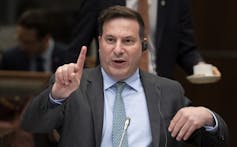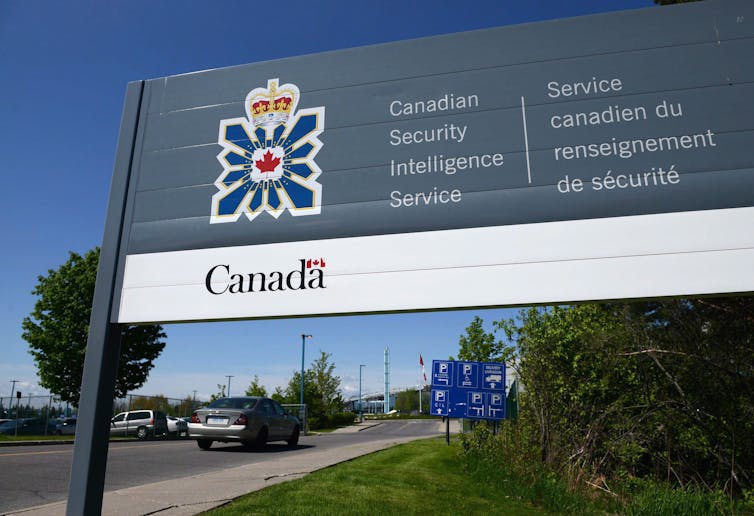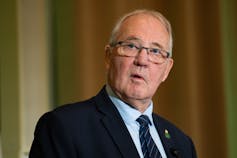“The first priority of the Government of Canada is to protect the safety and security of Canadians both at home and abroad.” So says Public Safety Canada.
One might presume this confers some obligation on the government to inform Canadians if their relations living abroad are threatened by a foreign state. Recent events suggest otherwise.
Two years ago, Ottawa had intelligence indicating that relatives of Conservative MP Michael Chong, who were living in Hong Kong, might be targeted for reprisal by the Chinese government. This was in retaliation for Chong sponsoring a parliamentary motion condemning Beijing for its treatment of the Uighur minority.
By targeting Chong’s family, China would “make an example” of an MP who expressed views in Parliament that angered Beijing.

THE CANADIAN PRESS/Adrian Wyld
Both Prime Minister Justin Trudeau and Marco Mendicino, the minister of public safety, claim the Canadian Security Intelligence Service (CSIS) — which possessed the intelligence — failed to elevate it to their level.
Nonetheless, the essence of the intelligence found its way into a briefing note that wound up in the Privy Council Office, comprised of public servants who advise the prime minister and his office, in the summer of 2021.
CSIS admonished
In other words, the information was allegedly buried and obscured in the bureaucracy. As a result, Chong was unaware of the threat to his family until the intelligence was leaked last week.
The federal government is only now expelling the diplomat accused of targeting Chong’s family.
Trudeau has admonished CSIS for failing to inform the government properly. He says he has now instructed Canada’s spy agency to bring any intelligence on threats to MPs to his attention.
Blame assigned. Problem solved. Move on? Not so fast.
What does this affair say about the culture and governance of national security in Ottawa? Catherine McKenna, the former environment minister under Trudeau, put it bluntly in a tweet, calling the revelations “appalling on a personal, political and diplomatic level. But not surprising based on my experience.” She added: “Be serious.”
That hits the nail on the head. On Trudeau’s watch, national security is not taken seriously.
How should this matter have been handled if the government did take its national security obligations seriously?
Regular meetings with CSIS director
Thirty years ago, I worked in the Office of the Solicitor General of Canada — the forerunner to today’s minister of public safety. The solicitor general was responsible for and accountable to Parliament for CSIS.
In those days, the CSIS director met regularly, if not weekly when the House of Commons was sitting, with the solicitor general, who was Liberal Herb Gray at the time.
It was a time-worn procedure to keep the minister, and therefore the government, informed on particularly sensitive and serious issues. Whether regular briefings like that occur today is anybody’s guess.
These are the types of meetings in which intelligence like the alleged targeting of Chong should have been clearly shared with the minister — not buried in a memo circulating among national security officials, but rather in a verbal briefing between CSIS and its minister.
If it involved Parliament and a sitting MP, the minister would then decide how to handle the intelligence from that point forward. In the Chong case, a competent minister would have informed the MP and the prime minister immediately.

THE CANADIAN PRESS/Sean Kilpatrick
Oath of secrecy
Some might argue the information was too sensitive to share with an MP lacking the requisite security clearance. But Chong is no garden-variety MP.
He is the foreign affairs critic for the Official Opposition, a former minister of the Crown and a Privy Councillor. Chong’s Privy Council oath of secrecy could have been invoked to ensure confidentiality.

THE CANADIAN PRESS/Spencer Colby
It’s hard to believe that Canada’s national security culture and procedures have degenerated to the point that the minister of public safety and his senior staff — who are cleared to receive intelligence — were not briefed on this issue by CSIS in the summer of 2021.
The minister at the time was Bill Blair, who has said: “It would have been useful to have that information at the time but it was never shared with me.”
Why the CSIS memo did not receive the attention it deserved in the Privy Council Office — along with the requisite interpretation so that its importance would be understood by the prime minister and his office — is also worth asking.
It’s likely because there was no dedicated National Security and Intelligence Advisor at the time.
Vincent Rigby, Trudeau’s national security adviser, retired in June 2021 and was not replaced until January 2022.
Too easy to blame CSIS
In the interim, there seems to have been various people, with day jobs of their own, “acting” in Rigby’s place. That means the position of National Security and Intelligence Advisor to the prime minister was a part-time gig for seven months.
This, too, speaks to the priority national security commands under Trudeau.
It’s easy to blame CSIS in this episode. But a serious national security culture comes from the top down, not from the intelligence agencies under the control of the federal government. A robust national security environment results in serious procedures, protocols and relationships for dealing with something as sensitive as the Chong affair.
That doesn’t seem to exist in Ottawa today. That itself is a risk to national security.


